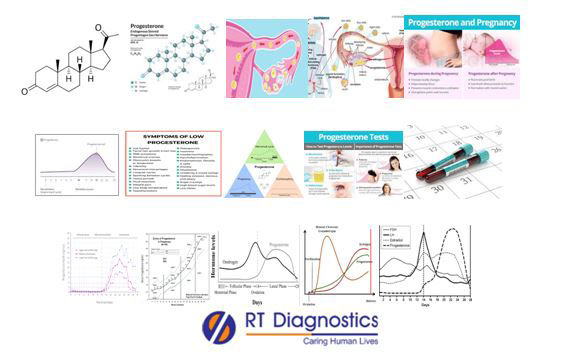Progesterone:
Why Progesterone Test ?
CLINICAL INFORMATION
Progesterone is one of the main female (pro-gestational) endogenous steroid sex hormones (apart from estrogen) synthesized by the corpus luteum in the ovaries and during the second half of the menstrual cycle in the female reproductive system. Although in males – adrenals and testes can also produce lesser amounts compared to females. Hence the powerful action of Progesterone hormone is effectively possible either with the hormone estrogen (in females) and/or with testosterone (predominantly in men) hormone. The formation of the corpus luteum is triggered by a surge in luteinizing hormone (LH) produced by the anterior pituitary (hence ovaries synthesize progesterone after ovulation – to receive, implant and support a fertilized egg during pregnancy). The hormone progesterone plays a vital role in ovulation (release of an egg from an ovary), prepares the endometrium (inner layer of the uterus) to implant fertilized egg in the uterus, prevents the further release of the egg until pregnancy has terminated, establishes the placenta, neovascularization of uterus for a growing fetus, strengthens the pelvic wall muscles in preparation for labour, stimulate the breast tissue to promote lactation, prevents lactation, maintaining pregnancy, regulates BP, improves mood and sleep etc. One of the active components is synthetic exogenous “progestin” (a component-active ingredient in oral contraceptives, hormone replacement therapy etc). Synthetically produced (exogenous) Progesterone medication - progestin (commercially available progestins) is also available as prescribed medicine and/or also as an over-the-counter drug. Progesterone medication is usually indicated in conditions including amenorrhea, to treat abnormal uterine bleeding related to hormonal imbalance, endometriosis, for the treatment of severe symptoms of premenstrual syndrome, HRT - hormone replacement therapy (progesterone is used in combination with estrogen - to oppose the action of estrogen as a part of HRT and to treat uterine bleeding – since estrogen alone can increase the risk of uterine cancer due to abnormal thickening of the lining of the uterus), post-hysterectomy cases (surgery performed to remove the uterus), anticancer hormonal therapy (eg. cervical cancers) etc. Major side effects of progestin include headache, tiredness, weight gain, stomach upset, vomiting, diarrhea, breast tenderness, weight gain, fluid retention, mood swing, excessive worrying, vaginal discharge, problems in urinating etc. Causes of low progesterone in women may arise due to the anovulatory cycle (anovulation fails to produce progesterone from ovaries), polycystic ovarian syndrome (PCOs), amenorrhea (lack of menstruation), menopause, pathologies related to ovaries, miscarriages, pre-eclampsia etc. Clinical symptoms of low progesterone levels are irregular periods, triggers of high estrogen levels, short cycles, premenstrual spotting, mood changes, sleep disturbances, anxiety, depression, regulation of body fluid levels, signals of the start of peri-menopause etc. Causes of high progesterone levels are time duration before menstrual cycle, during pregnancy, due to ovulation (after the cessation of the menstrual cycle), ovarian cyst, disorders of the adrenal gland (eg. congenital adrenal hyperplasia – deficiency of the enzyme 21 hydroxylase etc), ovarian cancer, molar pregnancy, abnormal placenta (growth of abnormal cells in the placenta – eg. when embryo doesn’t form correctly and the placenta grows into a non-cancerous tumour), the sign of pre-menstrual syndrome which includes clinical manifestations of anxiety, agitation, breast swelling with tenderness, depression, fatigue, weight gain, low libido, weight gain etc. A progesterone test is performed in cases associated with frequent abortions, infertility (unable to conceive), ovulatory disorders (to check for ovulation), ectopic pregnancy, miscarriages, hypogonadism in females etc. Additional tests in females include estrogen test, LH, FSH, GnRH – Gonadotropin-releasing hormone, Prolactin, beta-human chorionic gonadotrophin (β-hCG), AFP etc, while in males the tests include Testosterone and semen analysis etc. Other tests include CBC, imaging studies like pelvic ultrasound, transvaginal ultrasound etc.

General Instructions:
Sample Requirement: Specimen - Blood sample collected from the vein. Test Preparation: None.
NOTE - Sample for specimen collections may vary based on the patient’s condition/cases according to the patient’s presenting complaints/signs or symptoms:
SPECIMEN REQUIREMENT (Special or Rare Cases) - As instructed and guided by Physician / Clinician / Pathologist / as per Laboratory’s requirements, according to procedures and protocols.
This Multi-Specialty Clinical Referral Laboratory RT DIAGNOSTICS provides precise and accurate tests with an extensive range of testing services to the medical centres to help in the diagnosis and identification of pathology in the test specimens for infectious diseases and also to evaluate the function of organ systems of the patient. It prevents further complications and helps to stabilize and restore health to near normalcy at the earliest without delay.



